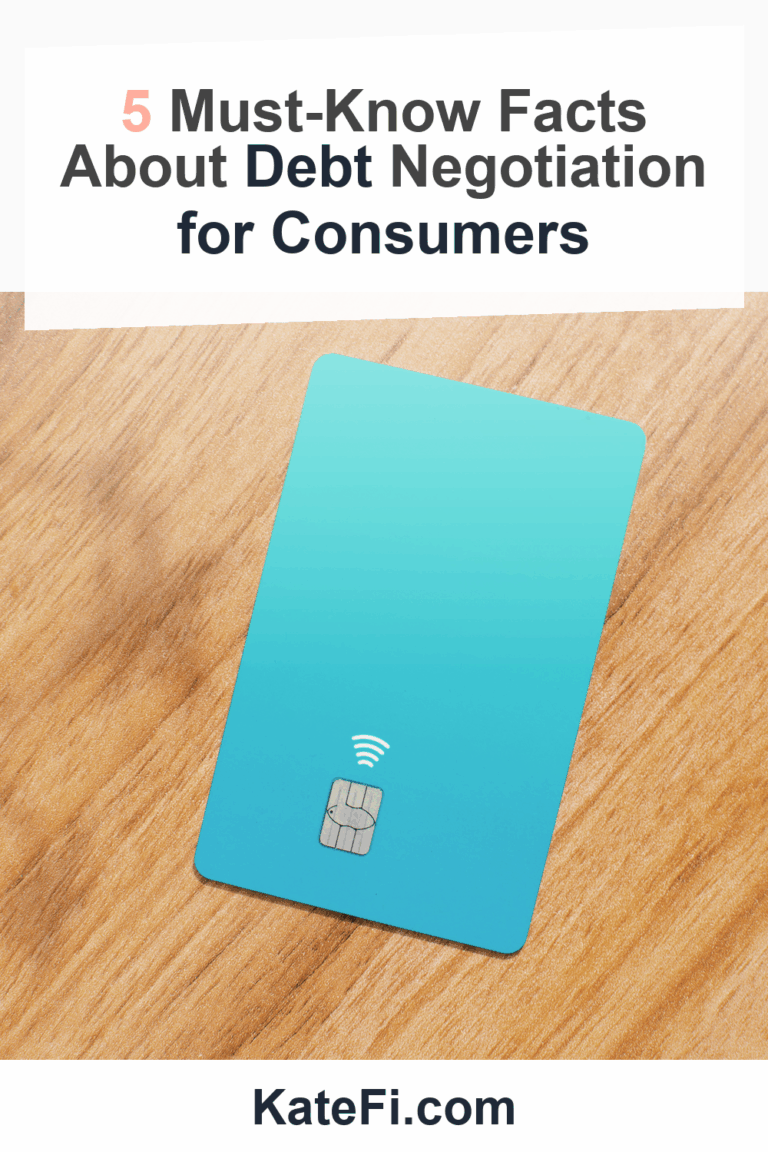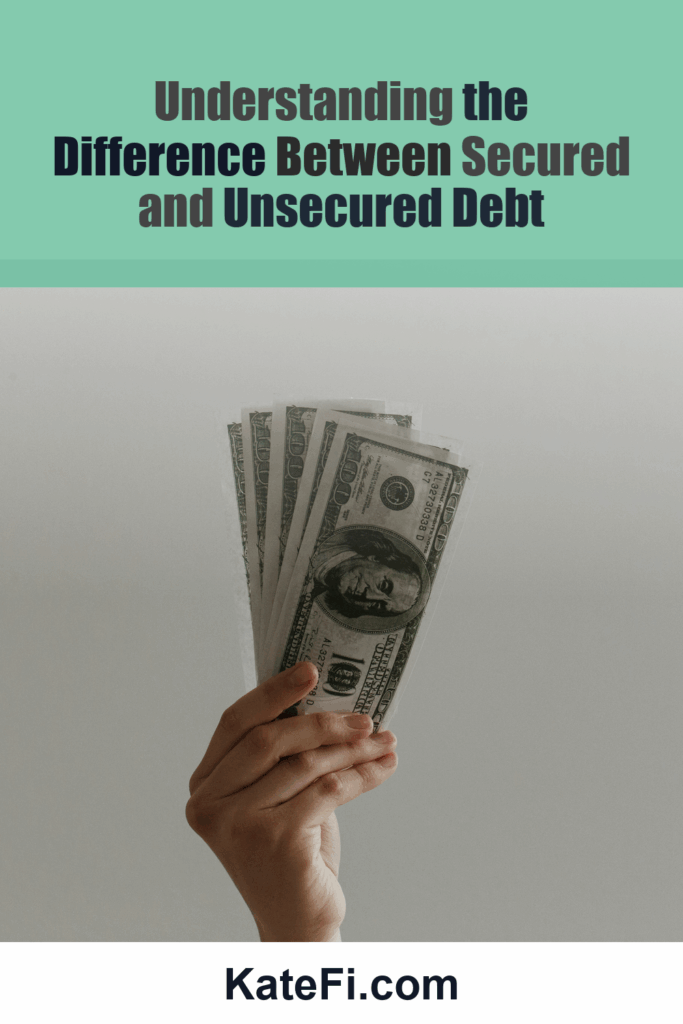5 Must-Know Facts About Debt Negotiation for Consumers
Debt can feel like an insurmountable burden, trapping individuals and families in a cycle of financial stress. Many consumers find themselves overwhelmed by bills, collections calls, and mounting interest rates. In such times, debt negotiation might seem like a beacon of hope. However, the world of debt relief is filled with misconceptions and potential scams that can further complicate the situation. In this post, we’ll explore five essential facts about debt negotiation, debunk common myths, and highlight how to avoid falling victim to scams.
Love our content? Show your support by following us — pretty please!🥺
FOLLOW ON PINTEREST
Hi! I’m Kate, the face behind KateFi.com—a blog all about making life easier and more affordable.
If you’re struggling with debt, we recommend getting a free consultation to explore your options and gain clarity on the best way forward.
Myth vs. Fact: The Truth Behind Debt Negotiation
👉 Start Your Free Debt Relief Review
Not available in IL, KS, OR, TN, UT, WV.
Myth 1: Debt Relief Always Improves Your Credit Score
Fact: While debt relief can help you get out of debt, it doesn’t guarantee a boost to your credit score. In fact, some debt relief methods, like debt settlement, may temporarily lower your credit score as creditors may report missed payments. The impact varies based on your situation and how lenders report to credit bureaus.
Myth 2: All Debt Negotiation Services Are Scams
Fact: While it’s true that some companies use aggressive marketing tactics or promise unrealistic results, there are reputable debt negotiation services that can genuinely help consumers manage their debt. The key is to conduct thorough research, read reviews, and look for companies that offer transparency in their processes. Always ensure they have clear policies and ethical practices.
Myth 3: You Must Be Incredibly Deep in Debt to Get Help
Fact: Consumers can seek debt relief services at various stages of their financial journey. Even if you’re managing your bills but struggling to keep up, a consultation can provide insights into your options and empower you to take control of your financial future.
Myth 4: Debt Negotiation Is a Quick Fix
Fact: Debt negotiation can take time and effort. While some consumers see quick resolutions, others may face complex negotiations that require persistence and strategy. It’s essential to set realistic expectations and recognize that effective debt negotiation is a process rather than an instant solution.
Myth 5: You Can Handle Everything Alone
Fact: While some consumers may be successful negotiating with creditors on their own, many find that professional debt negotiators have the experience and expertise to achieve better outcomes. Negotiation requires an understanding of creditor practices and negotiation tactics that can significantly improve the chances of favorable terms.
Myth 6: If You Don’t Pay, Your Debt Will Just Go Away
Fact: Ignoring debt rarely leads to favorable outcomes. Instead, it often results in increased interest, collections, or even legal action. Addressing debt proactively through negotiation can lead to more manageable terms and reduce the total amount owed.
Myth 7: All Debt Relief Programs Are the Same
Fact: There are various types of debt relief programs, including debt consolidation, debt settlement, and credit counseling. Each has its benefits, drawbacks, and fees. Consumers should take the time to research and understand which program aligns best with their financial goals and circumstances.
Understanding Debt Relief Options
Understand pros/cons of settlement vs consolidation vs DMP for your exact mix of debts.
Not available in IL, KS, OR, TN, UT, WV.
When considering debt negotiation, it’s crucial to know what options are available to you. Here’s a brief overview:
| Type of Debt Relief | Description | Pros | Cons |
|---|---|---|---|
| Debt Settlement | Negotiating with creditors to reduce the amount owed | Can significantly reduce total debt | May negatively impact credit score |
| Debt Consolidation | Combining multiple debts into one loan | Easier to manage, often lower interest rates | May extend repayment period |
| Credit Counseling | Professional guidance on budgeting and debt management | Free or low-cost services | Doesn’t eliminate debt |
| Bankruptcy | Legal process to eliminate or restructure debt | Provides a fresh financial start | Significant long-term credit impact |
How to Avoid Common Debt-Relief Scams
Lower Your Unsecured Debt
If you have $5,000+ in credit card or personal loan debt, a free consult can review options like settlement or hardship plans.
- One-on-one call to review your debts and goals
- See potential monthly payment reductions
- No obligation to enroll
Not available in IL, KS, OR, TN, UT, WV.
- Research the Company: Look for reviews, testimonials, and ratings on platforms like the Better Business Bureau (BBB). A reputable service should have a track record of positive customer experiences.
- Ask About Fees: Legitimate debt relief companies will be upfront about their fees. Be wary of companies that ask for payment before providing any services.
- Request Written Information: Before agreeing to any services, ask for written details regarding the program, including the terms and conditions. This will help ensure you understand what you’re getting into.
- Watch for Guarantees: Be skeptical of companies that promise to erase your debt or guarantee results. Debt negotiation is an uncertain process, and no outcome can be assured.
- Consult with Multiple Providers: Don’t settle on the first option you come across. It’s wise to compare several debt relief options, evaluate their effectiveness, and see which resonates best with your needs.
What to Gather for a Faster Review
If you decide to consult a debt relief service, prepare the following documents to facilitate a quicker evaluation:
- List of all debts (credit cards, loans, etc.)
- Current statements for each debt
- Income documentation (pay stubs, tax returns)
- Monthly expenses overview (bills, living costs)
- Any correspondence from creditors (collection notices, etc.)
Having this information ready will enable a smoother consultation process and ensure you receive tailored advice.
The Impact of Debt Relief on Credit
Debt negotiation can have varied effects on your credit score. While successful negotiation may lead to a more manageable debt situation, it might also trigger missed payments and settlements that could be reported negatively on your credit report. However, with responsible financial management afterward—like making timely payments and reducing debt—it’s possible to rebuild your credit over time.
Consider this: according to FICO, a missed payment can affect your score for up to seven years, while a successfully negotiated debt can have a smaller impact if managed well. It’s essential to weigh these potential outcomes when deciding on debt negotiation.
Ready to Take Control of Your Debt?
Don’t let the misconceptions surrounding debt negotiation keep you from taking the necessary steps to improve your financial situation. If you’re ready to explore your options, we encourage you to get a free consultation.
Understand your rights, gather your documents, and empower yourself with knowledge as you navigate your debt relief journey. Remember, taking action is the first step towards reclaiming your financial freedom.
✅ See If You Qualify for Debt Relief
Important: This content is for education only—not legal, tax, or financial advice. Results and eligible programs vary by situation and state. Fees apply if you enroll and complete a program. Debt relief can affect credit; missed payments may lead to collections/lawsuits. Not available in IL, KS, OR, TN, UT, WV.
With the right information and a proactive approach, you can successfully navigate debt negotiation and work towards a more stable financial future. Don’t hesitate—start your journey towards financial freedom today!






















